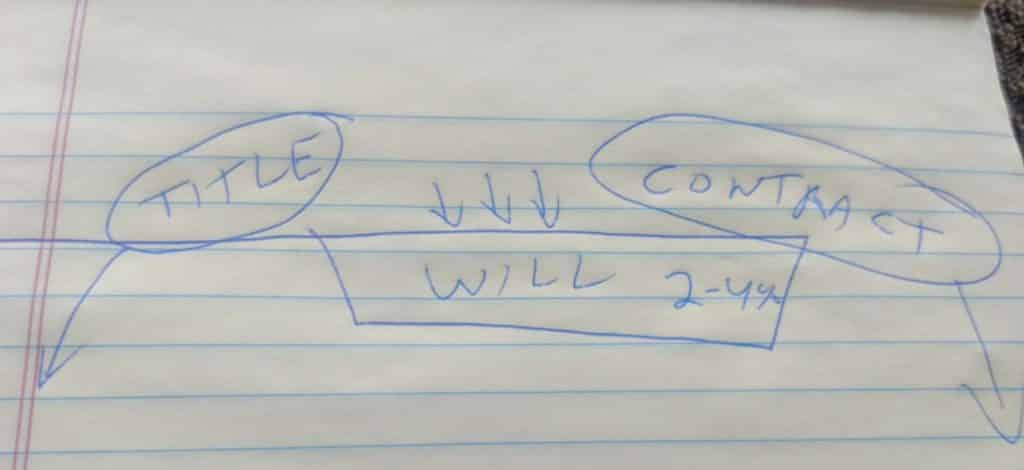
What Can You Do If Your Dad Leaves You Out of His Will?
There are limited actions you can take, if you’re disinherited.
Call us Anytime
Laurel, MD 20707
Downs Law Firm, P.C.

There are limited actions you can take, if you’re disinherited.

Probate is what’s left over At the end of the day, there may be some things left over to go through probate, meaning they didn’t avoid the process by title or contract. What’s so bad about that? I don’t know that there’s anything so terrible about probate. It is a necessary process to transfer title of property if no other options have been exercised. People who I have worked with in the Probate Court are generally helpful and dedicated. The Court imposes deadlines which make the case move through the system. However, the two main reasons people want to avoid the probate court, or any other court process are money and time. I often here attorneys say that probate is not that bad in Maryland. Actually, I only hear attorneys say that. In Maryland there are various court costs, bonding fees, probate fees, and attorney’s fees as well as Personal Representative’s commissions. The highest of these fees are often attorney’s fees. What’s so bad about that? The allowable fees for attorneys and Personal Representatives are combined is about 3.6% of the assets. For example, suppose the deceased person has a house worth $300,000 and a mortgage of $250,000, which figure is used to calculate the allowable fees and commissions? The formula is based on the gross assets, not the net assets. The allowable commissions and fees for a $300,000 probate are $11,880. In this example, the allowable fees are 24% of the net value ($11,880/$50,000). I generally estimate 2% to 4% as the administrative expenses for most families in probate. Additionally, probates ordinarily take somewhere between 9 months and 18 months to complete. If assets are complicated in nature, the time could be much longer. For small Estates, meaning under $50,000, the process can be much shorter. An additional reason some of my clients want to avoid probate is that your Last Will and Testament is a public record. Someone going to the Courthouse can read your Will, see the values of all the assets passing through the court system, learn the timing of distributions, and find out who gets what and when to they get it. This is more information than some many of my clients want to share with the public.

Probate is what’s left over I draw about ten frying pans a week on a legal pad. This is not due to my great artist ability. Last week I explained that Wills work through a process called Probate. When someone dies, property may be transferred by title, such as the transfer of a house to a spouse when the first spouse dies. It is easy and essentially automatic. If a person dies and the title doesn’t convey ownership, then a contract may do so instead. More about that next week. There are only three ways assets transfer at death: By Title, by Contract, or by Probate. If the title and contract don’t transfer ownership, then a probate estate does. If a decedent as a will, this is activated then: if not, then the law of the state of they lived in writes one for them. Since the dead person is not here to transfer title, that role is given to the Personal Representative. Once appointed, that person can sign contracts, deeds, tax returns, etc. All this is done with the oversight of the probate Court. Probate is not bad: it serves a necessary function. Many year ago, I was part of a bar association discussion years ago about probate and its avoidance. I was advocating the use of Revocable Living Trusts as reasonable alternatives to Court supervised transfers. I felt like a baby harp seal hunter at a PETA meeting. The outrage and venom directed at me for suggesting that Probate was to be avoided” were palpable. Most of the lawyers present, and the then Register of Wills, insisted as a strong refrain that “Probate is not that bad…” The only people I have heard insist that this is true are attorneys and Probate Court personnel. I pointed out the hypocrisy of this by position by asking “How many of you have your life insurance policies and/or retirement plans payable to their probate estates?” Of course, no one did so, because naming a beneficiary was simple and the probate Court could be avoided. If probate isn’t so bad, then why no? Maybe because of administrative fees, Court costs, Attorney fees, Personal Representative Commissions, which in Maryland can be 3.6% to 4%. Maybe because the court process can cause long delays before funds are available: from seven months to several years is not unusual. Finally Probate records are public, meaning that your neighbor can go to the Court, read your will, find out who is getting what, when they get it, and who is in control. For some of my clients, keeping this private is preferable. Is short, probate is time consuming, expensive and is completely public. The Court process provides supervision, which is some cases is badly needed. Most of my clients name people that they trust and don’t want supervised. To weigh out your options, its best to seek the advice of an estate planning attorney. Note: This is the Second of a Series of Five to be published
There are many kinds of trusts. They aren’t just for the wealthy. Our practice has featured the preparation of wills and trusts exclusively since 1995. In the intervening years, we have prepared thousands of each such plans, and now work extensively implementing them after a client has died. Our caseload is now about 45% administration of wills and/or trust. We are often asked by clients which is better. That depends on many factors. But Trusts seem like a much better choice often, after the time comes to use the planning. If maintained and funded, a trust can be more cost effective, private and easier to administer. On the other hand, I know many attorneys who scoff at the notion of using a trust for people who are not millionaires. Probate, they often assure, is not so bad. And is a trust necessary? Everyone needs an estate plan. However, everyone should also at least consider a trust, according to The New York Times in “Life After Death? Here’s Why You Should Have a Trust.”It turns out that many people who are not wealthy, can also benefit from having a trust. There are many different kinds of trusts which serve different purposes. One is a revocable trust, which the owner can change. They are considered by many to be the “work horse” of modern estate planning. A revocable trust can avoid the need for a public probate court proceeding after the person dies, saving time and keeping money from being immediately available to heirs and executors alike. Trusts are also useful for times when people become incapacitated and need someone else to take care of their finances. Because many more people are living longer and the number of people with dementia is increasing, there are more situations where trusts are useful to the family and caregivers. A will is different than a trust and is a public document. The probate process requires a disclosure of assets, bank and other financial accounts and the names of beneficiaries. That information remains private with a revocable trust. Other considerations regarding trusts: You should have any type of trust set up by an estate and trust attorney. A house, real property, bank or investment accounts can be placed into a trust. A revocable trust does not always end at the death of the original owner. However, just how long it may last, depends upon the laws of your state. People also use trusts to protect their assets from others or to assure the long-term care of someone who is disabled. You can have a professional manager, family member or friend as a trustee or co-trustee of a trust. Sometimes having a licensed professional who has federal reporting requirements can provide an extra layer of protection. An estate planning attorney can advise you on creating an estate plan that fits your unique circumstances and may include taking a close look at trusts. Reference: The New York Times (March 22, 2018) “Life After Death? Here’s Why You Should

The talk may be difficult but may turn out to be necessary. When someone dies or becomes disabled, the people who support and love that person are often in the position of walking into the middle of a movie and trying to figure out “What is going on?” As we age, sharing information ahead of time can be a big help. It might not be the easiest conversation you have ever had. However, it is a good idea to have a talk with your loved ones about what steps to take as you go through the aging process, according to The Des Moines Register in “In 2019, resolve to have a difficult conversation.” The person who is contemplating needing help, may want to start the conversation but the person who may be called on to help may find it too difficult to consider. Who wants to think about their parents getting frail and needing help going to the bathroom? No one. The person who is starting to feel the impact of aging may already be aware of some limitations. However, talking with their children or potential caregivers may change the conversation from “someday” to “soon.” The loss of independence is one of the big milestones, just as gaining independence is a milestone earlier in life. That’s a hard thing to accept for both sides. Those who have lived through this process of needing to become caregivers say that it would have been easier if they would have known what their loved ones wanted. So, would have been knowing what kind of help their loved ones could afford. It’s better to have time to research available resources in advance, rather than operating in crisis mode. This is what your conversations need to address: Medications, physical health, emotional well-being and health care providers Their wishes, if their health declines slowly or rapidly. Do they want to stay at home? Who would they want to help with daily care? Finances: Can they afford to pay for care at home? Has any Medicaid planning been done? What government programs are they eligible for? Do they have a CPA or financial advisor? Estate plan: Where is their Last Will and Testament? Is there a Power of Attorney, Living Will or Medical Directive in place? Who is their estate planning attorney? Documents, including birth certificates, Social Security, insurance cards, safe deposit box keys, computer passwords, etc. Seven out of 10 people over age 65 will need help from others at some point. Most will need it for at least three years, so it might be wise to have the conversation before a difficult situation arises.Reference: The Des Moines Register (Dec. 19, 2018) “In 2019, resolve to have a difficult conversation”
There are some important documents that should always be in your estate plan to protect your family. However, some people still leave them out, according to Consumer Reports in “8 Essential Steps for Estate Planning.” A survey from Caring.com showed that as many as 60% of adults don’t have estate planning documents. When they asked families with young children, fewer than one in ten have even designated a guardian to take care of their children, if both parents should die. Worse yet, we have worked with numerous cases where people thought they had documents in place, but due to their own misunderstanding of the law or requirements, their plans were agonizing disappointments of what should, and could have been… What happens when there’s no planning in place? Even the simplest things become more complicated, and complicated things become financial and legal nightmares. When there’s an emergency and decisions need to be made, the entire family is subjected to more stress and costs than would otherwise be necessary. Here are the eight steps you need to take, right now, to protect your family: Get the professional help you need. The change to the tax law may or may not impact your family and your estate plan, but you won’t know until you sit down with an estate planning attorney. Trying to do this online, may seem like a simpler way, but you will not have the same peace of mind as when you sit down with an experienced attorney—and one who knows your state’s laws. Create a will. This is a legal document that explains how you want your assets to be distributed after you die. It names an executor to carry out your instructions. If you have minor children, this is an especially important document, since it is used to name their guardian. If you have no will when you die (called dying “intestate”), then the laws of your state determine how your assets are distributed and who rears your children. Depending on where you live, your spouse might not automatically inherit everything. Discuss whether you need a Revocable Living Trust. In most states, when you pass away, your estate goes through a process called “probate.” The courts basically review your estate plan and determine whether everything looks right. The problem is that your will becomes a public document—and so does information about your assets. Some people prefer to keep their lives private by transferring assets to a revocable living trust, which distributes assets according to your instructions at your death. Titles to the assets must be changed so they are “owned” by the trust. This is known as “funding” the trust. You still retain complete control of your assets, since you are the trustee. However, if you fail to retitle assets, the estate goes through probate. You will also still need a will to protect your minor children. Review your beneficiaries. Whether you remember it or not, when you open many different kinds of accounts—banking, investment—you assign a beneficiary

For a young family, when is the right time to put together an estate plan? Right before you die is the correct, but not realistic, answer. Estate planning is especially important for families with young children and to be updated to pass on assets in later years, according to the Lodi News Sentinel in “Planning for what comes last.” Consider an estate plan as a gift for the next generation, as is making funeral plans in advance. I used to avoid doctor visits until a friend pointed out the visit was not just for me but for the whole family. Doing what you should is for them. You can’t assume that your adult children will know what you want for your funeral, and you don’t want them to have to make decisions during a time of great sadness. These are gifts that parents who love their children can give: taking care of the business side of their lives and their deaths so that a difficult time is manageable. Once you have worked with an estate planning attorney to prepare all the necessary documents and made funeral plans, the next step is to share that information with your heirs. It’s not an easy conversation to have. Most of us tend to keep that side of our lives private from our kids, no matter how old we become. However, sharing this information can keep families from fighting in the future. It is not easy to know how much different family members can handle and who can be trusted with what information while you are living. There are times when people who appear completely selfless suddenly become greedy when an inheritance is being probated. It’s hard to anticipate this. However, there are several things that you can do now to make it easier for those you love. Have a will and if appropriate, a trust, created with an estate planning attorney. Don’t neglect a power of attorney for health and for finances. Make funeral plans and tell your family about those plans. Make an end-of-life plan. Don’t leave it to others to make these difficult decisions if you know what you want to have done. Plan for your pets in case they outlive you. Protect your digital assets by obtaining the correct information for all your social platforms so your loved ones are empowered to access and close accounts after your death. An estate planning attorney can advise you in creating an estate plan that fits your unique circumstances. Reference: Lodi News-Sentinel (July 1, 2018) “Planning for what comes last”